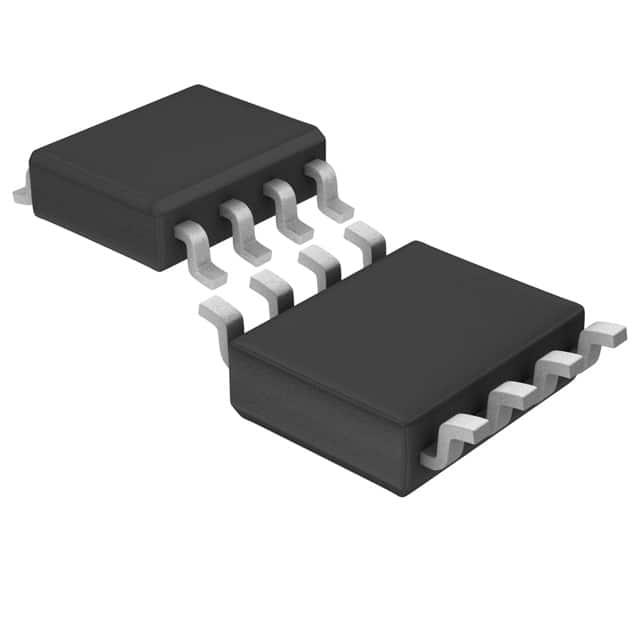LT1722CS8#PBF
Product Overview
Category
The LT1722CS8#PBF belongs to the category of operational amplifiers (op-amps).
Use
It is commonly used in electronic circuits for amplifying and processing analog signals.
Characteristics
- High-speed performance
- Low input offset voltage
- Low noise
- Wide supply voltage range
Package
The LT1722CS8#PBF is available in an 8-pin SOIC package.
Essence
This op-amp is essential for applications requiring high-speed signal processing and precision amplification.
Packaging/Quantity
The LT1722CS8#PBF is typically sold in reels containing a specific quantity, such as 250 or 1000 units per reel.
Specifications
- Supply Voltage: ±2.5V to ±15V
- Input Offset Voltage: 150µV maximum
- Bandwidth: 50MHz
- Slew Rate: 20V/µs
- Operating Temperature Range: -40°C to 85°C
Detailed Pin Configuration
- OUT-
- V-
- IN-
- V+
- NC
- IN+
- VCC+
- OUT+
Functional Features
- High-speed signal processing
- Low input offset voltage for precision applications
- Wide supply voltage range for versatility
- Low noise for accurate signal amplification
Advantages and Disadvantages
Advantages
- High-speed performance suitable for demanding applications
- Low input offset voltage ensures accuracy in signal processing
- Versatile supply voltage range allows for flexible use in various circuits
Disadvantages
- Limited availability of alternative models with similar specifications
- Higher cost compared to standard op-amps
Working Principles
The LT1722CS8#PBF operates based on the principles of differential amplification and feedback control. It amplifies the voltage difference between its two input terminals while maintaining precise control over gain and output characteristics.
Detailed Application Field Plans
The LT1722CS8#PBF is well-suited for the following applications: - High-frequency signal processing - Instrumentation amplifiers - Data acquisition systems - Precision measurement equipment
Detailed and Complete Alternative Models
While the LT1722CS8#PBF offers unique features, alternative models with similar specifications include: - AD8065 - OPA211 - ADA4898-1
In conclusion, the LT1722CS8#PBF is a high-performance operational amplifier designed for precision signal processing and amplification in a wide range of electronic applications.
Word count: 410
기술 솔루션에 LT1722CS8#PBF 적용과 관련된 10가지 일반적인 질문과 답변을 나열하세요.
Sure, here are 10 common questions and answers related to the application of LT1722CS8#PBF:
What is LT1722CS8#PBF?
- LT1722CS8#PBF is a high-speed operational amplifier designed for use in applications requiring wide bandwidth and high slew rate.
What is the typical supply voltage range for LT1722CS8#PBF?
- The typical supply voltage range for LT1722CS8#PBF is ±5V to ±15V.
What is the input voltage noise density of LT1722CS8#PBF?
- The input voltage noise density of LT1722CS8#PBF is typically 4.9nV/√Hz.
What is the unity-gain bandwidth of LT1722CS8#PBF?
- The unity-gain bandwidth of LT1722CS8#PBF is typically 100MHz.
Can LT1722CS8#PBF be used in low-power applications?
- Yes, LT1722CS8#PBF has a low quiescent current of 6.5mA per amplifier, making it suitable for low-power applications.
What is the maximum output current of LT1722CS8#PBF?
- The maximum output current of LT1722CS8#PBF is typically ±40mA.
Is LT1722CS8#PBF suitable for driving capacitive loads?
- Yes, LT1722CS8#PBF is designed to drive capacitive loads up to 100pF.
What is the temperature range for LT1722CS8#PBF?
- LT1722CS8#PBF is specified to operate over the industrial temperature range of -40°C to 85°C.
Can LT1722CS8#PBF be used in audio applications?
- Yes, LT1722CS8#PBF can be used in audio applications due to its wide bandwidth and low distortion characteristics.
What are some typical applications for LT1722CS8#PBF?
- Typical applications for LT1722CS8#PBF include active filters, video amplifiers, high-speed integrators, and fast sample-and-hold circuits.
I hope these answers provide the information you were looking for! If you have any more questions, feel free to ask.


